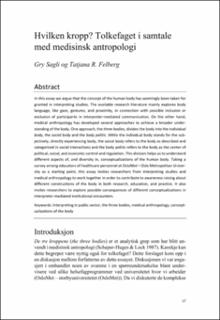Hvilken kropp? Tolkefaget i samtale med medisinsk antropologi
Chapter, Peer reviewed
Published version
Permanent lenke
https://hdl.handle.net/11250/3014415Utgivelsesdato
2022-06-28Metadata
Vis full innførselSamlinger
Sammendrag
In this essay we argue that the concept of the human body has seemingly been taken for granted in interpreting studies. The available research literature mainly explores body language, like gaze, gestures, and proximity, in connection with possible inclusion or exclusion of participants in interpreter-mediated communication. On the other hand, medical anthropology has developed several approaches to achieve a broader understanding of the body. One approach, the three bodies, divides the body into the individual body, the social body and the body politic. While the individual body stands for the subjectively, directly experiencing body, the social body refers to the body as described and categorized in social interactions and the body politic refers to the body as the center of political, social, and economic control and regulation. This division helps us to understand different aspects of, and diversity in, conceptualizations of the human body. Taking a survey among educators of healthcare personnel at OsloMet – Oslo Metropolitan University as a starting point, this essay invites researchers from interpreting studies and medical anthropology to work together in order to contribute to awareness raising about different constructions of the body in both research, education, and practice. It also invites researchers to explore possible consequences of different conceptualizations in interpreter-mediated institutional encounters.
